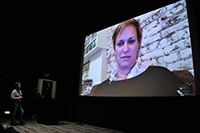Film Sparks Talk of Female Perspective

Diary of a Teenage Girl Producer Anne Carey Skypes in for a discussion following the screening of her film Thursday, February 11. Photo/Victoria Bilcik ’17
More than 100 Emerson College students and Boston community members of all ages and genders attended a screening of The Diary of a Teenage Girl at the Bright Family Screening Room on Thursday, February 11. The film premiered at Sundance in January of last year, and was distributed by Sony Pictures Classics in August. The screening was part of the Bright Lights film and discussion series.
A conversation with producer Anne Carey, made possible with the help of professor Linda Reisman, followed the showing of the film via Skype. Carey, who is also the president of production at Archer Gray, was nominated for Best Feature at the Gotham Awards, and Best First Feature at the Independent Spirit Awards.
Set in the 1970s, The Diary of a Teenage Girl tells the story of Minnie (Bel Powley), a 15-year-old aspiring cartoonist who begins exploring her own sexuality. At the height of her lust, she has an affair with her mother’s boyfriend, Monroe (Alexander Skarsgård). As their relationship progresses, Minnie grows empowered, even as she faces the taboo of female sexuality. Throughout her experimentation with hard drugs, men, women, and more, Minnie finds her independence and unapologetically embraces her sexuality.
In the discussion following the film, Carey said she was proud of the positive response from women in particular. She recalled her son telling her about the buzz surrounding the film at his school. “He said he’s heard tables of girls talking about it in the dining hall,” she said. “That means we made an impact.”
Although some audience members were critical of the nudity in the film, David Carliner ‘17 called it his favorite movie he saw last year. “I wasn’t a teenage girl, I’m not a woman,” he said. “But I still personally resonate with [Minnie]. If you’re a person that’s vulnerable, and you’re just trying to figure yourself out, that’s a character who’s really going to speak to you.”
Emma Glassman-Hughes ‘17 echoed Carliner’s sentiments, saying “As a woman, it’s something that I can immediately laud and be really proud of this movie and be happy that there’s a realistic depiction of somebody like me on film.”
Glassman-Hughes noted the importance of the discussions that follow the films screened on campus, because students have a responsibility to remain critical, even when they appreciate a film.
“Over the last year, there’s been a lot of conversation about race, and if you analyze this film from that perspective, it didn’t handle that at all and it didn’t have a very intersectional focus,” she said. “But it’s still a great film and it still speaks to a lot of people. And I think as Emerson students we have a unique position where we’re able to still appreciate a film and be critical of it at the same time.”
Anna Feder, curator of the Bright Lights film series, explained that this movie was an obvious choice for Bright Lights. “I wanted to make sure we had a very strong contingent of female-directed feminist films,” she said in an interview following the event. “We certainly haven’t seen a film exactly like this. And of course, I love the animation as well.”
This resonated with Carliner, who said “I think it’s a great example of why it’s so important to have women in charge of film, especially when they’re telling stories about women.”
Bright Lights screenings take place every Tuesday and Thursday evenings, followed by a discussion with someone affiliated with the film or an Emerson faculty member. All events are free and open to the public, unless otherwise noted.
Categories